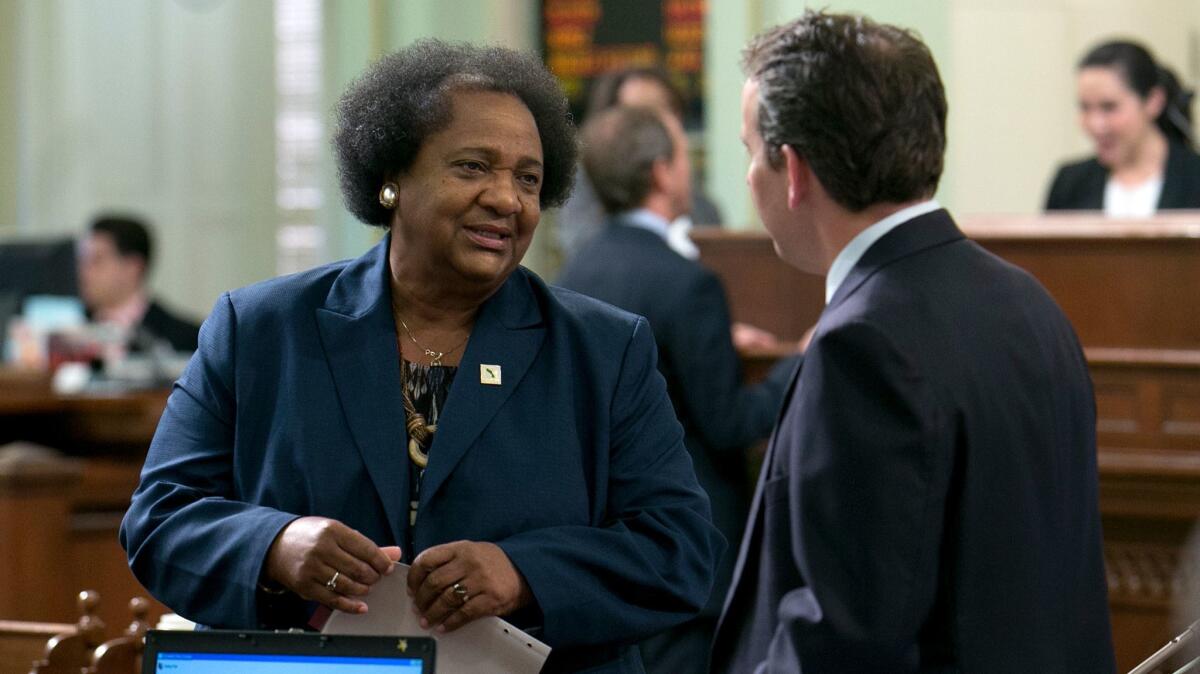Q&A: Here’s how California officials are trying to prevent racial profiling by police

- Share via
This week, California Atty. Gen.
Starting with the Los Angeles Police Department and other large law enforcement agencies in July 2018, officers will collect information detailing race, gender and other demographic details every time police pull someone over in their cars or otherwise detain them.
Here’s why the plan exists, what its author hopes its will accomplish and how the new rules will work:
Why are police departments going to collect data in the first place?
Civil rights advocates have long argued that police treat blacks, Latinos and other minority groups differently than whites. Criminal justice researchers have been analyzing data about law enforcement interactions to try and understand police activity.
In Oakland, black men were four times more likely to be searched than whites during a traffic stop and were more likely to be handcuffed even if they weren’t arrested, according to a 2016 report from Stanford academics who analyzed the city’s police stop data.
A more recent Stanford study found that in Los Angeles County, black drivers were stopped more frequently than whites and Latinos.
Researchers differ over the value of such data in revealing police racial biases — higher crime rates in some neighborhoods with large minority populations could help explain racially disparate stop rates, for instance — but collection efforts are spotty across California. That’s where this initiative comes in.
In 2015, during the height of the Black Lives Matter protests, Assemblywoman Shirley Weber (D-San Diego) wrote legislation to force every police department in California to collect racial and other demographic data when officers stop people. The aim, Weber said, is to inform policy for how police interact with communities of color.
“Data is the best tool for addressing community concerns about racial bias in policing,” Weber said in a statement. “The information collected will help get us past the debate about whether the problem exists, and instead help us move forward in determining the scope of the problem, who’s targeted and where it might be concentrated.”
Where do things stand now?
Weber’s bill required the attorney general’s office to figure out how the data collection process would work.
Would officers have to collect data on traffic stops or pedestrian and bike stops as well? Would officers track just racial data, or gender and other demographic information, too? Are there certain situations, such as during an active shooter investigation, where cops wouldn’t need to fill out the forms?
These rules were supposed to be finished by January, but they weren’t. The process was delayed further when Becerra took over for Kamala Harris after her election to the U.S. Senate.
An initial version of the regulations gave law enforcement groups heartburn because they believed the process was too burdensome. San Diego’s police chief, for instance, estimated it would take her officers 17,000 hours annually to collect the data required.
Becerra met with police departments, civil rights groups and researchers before releasing this week’s revisions. He also enlisted the Los Angeles Police Department and a handful of other agencies in April to test how officers might tally the demographic information.
Under the revised regulations, police officers will have to collect data on nearly every stop they make, including interactions with pedestrians and people on bikes. They’ll have to track a person’s gender, English proficiency and any disabilities as well. But in emergencies, such as mass evacuations during bomb threats or earthquakes, the rules don’t apply.
Reaction to Becerra’s revision has been slow. Michael Durant, president of the 69,000-member Peace Officers Research Assn. of California, which represents most rank-and-file officers in the state, said his organization was reviewing the new proposal.
The regulations still are not final, and Becerra’s office could make more changes.
When will the new rules take effect?
The Los Angeles police and Los Angeles County sheriff’s departments and the seven other agencies with 1,000 or more officers will begin collecting the data in July 2018 and release their first annual reports in April 2019.
Every year, more departments will be required to start collecting data. By 2022, all police agencies in California will be responsible for doing so.
ALSO
Rules for collecting racial profiling data in California are delayed
California's new top cop has to make some big policing decisions soon. No one knows what he'll do
Get the L.A. Times Politics newsletter
Deeply reported insights into legislation, politics and policy from Sacramento, Washington and beyond. In your inbox three times per week.
You may occasionally receive promotional content from the Los Angeles Times.








